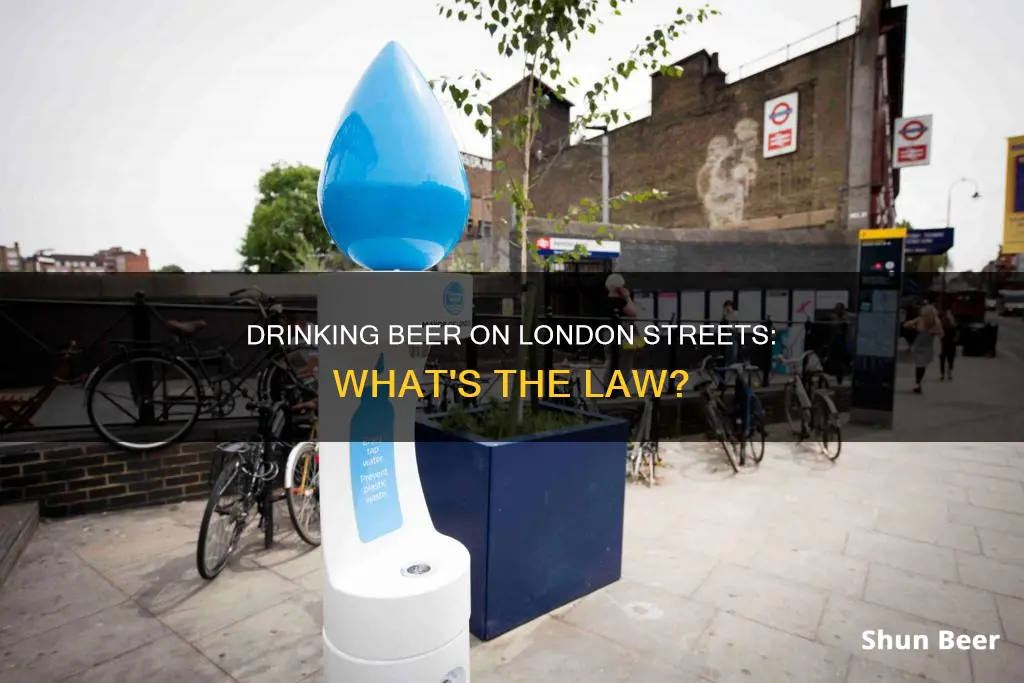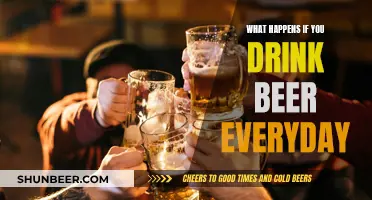
Drinking in public is a topic that varies significantly around the world, with some countries condemning it and others accepting it as a social norm. In the UK, there is no general prohibition on drinking in public, but certain offences related to alcohol consumption may be committed in public places. In London, the laws and social norms surrounding drinking beer on the street are nuanced and subject to change. So, can you drink beer on the street in London?
| Characteristics | Values |
|---|---|
| Drinking beer on the street in London | Legal for people over the age of 18 |
| Illegal in areas where Public Space Protection Orders (PSPO) are in place | |
| Banned on Transport for London (TFL) services |
What You'll Learn

Drinking in parks
The Royal Parks website states that drinking alcohol in parks is allowed, as long as it is for personal consumption and not sold. This means that you are free to drink in London's popular parks such as Hyde Park, Greenwich Park, and Richmond Park. However, it is important to note that alcohol is only permitted for those over the age of 18.
While drinking in parks is generally allowed, there may be specific locations within parks that are designated as alcohol-free zones. These areas are usually signposted, and it is important to respect these restrictions. Additionally, some parks may have certain events or areas where alcohol consumption is prohibited, so it is always a good idea to check the specific rules of the park you plan to visit.
In Scotland, each local council has its own set of bylaws regarding public alcohol consumption. For example, the City of Edinburgh allows drinking in public places, but individuals must stop if asked by the police. In Glasgow, drinking alcohol or carrying an open container of alcohol in public places is prohibited.
It is important to note that while drinking in parks is generally accepted in the UK, it is crucial to drink responsibly and not cause any disturbance or harm to the environment. Properly disposing of alcoholic containers and respecting the cleanliness of the parks is essential.
Beer and Suboxone: Is It Safe to Mix?
You may want to see also

Drinking on public transport
Drinking alcohol in public is banned in many places in the UK. While there is no general prohibition on drinking in the street, certain offences relating to alcohol may be committed in public places. For example, it is an offence to be drunk and disorderly in a public place or on a highway.
In London, the rules around drinking alcohol in public places, including on public transport, have changed over time. Currently, drinking alcohol is banned on many Transport for London (TfL) services, including buses, trams, tubes, and the Docklands Light Railway (DLR). This means that passengers are not allowed to consume alcohol or carry open containers of alcohol on these transport services. These rules were introduced following the election of Boris Johnson as Mayor of London, with the aim of reducing antisocial behaviour. However, these restrictions do not apply to all commuter services in London, and alcohol may still be consumed on some National Rail and Thames Clippers services.
It is important to note that the rules around drinking alcohol on public transport can vary depending on the operator and the location. While drinking alcohol is generally banned on TfL services in London, it may be allowed on longer-distance train routes or during certain events. For example, some rail services in the UK allow the sale and consumption of alcohol on board, while others may implement "dry" trains for specific events or routes where alcohol is not permitted. Therefore, it is always advisable to check with the transport operator before consuming alcohol on board.
In addition to the rules specific to London, there are also broader regulations around drinking on public transport in the UK. Drinking alcohol is banned on many other public transport services across the country, including ScotRail train services in Scotland and Translink trains and buses in Northern Ireland. These bans are typically enforced through the operator's terms and conditions for passengers, and non-compliance may result in police intervention. It is also an offence to be drunk on a train in the UK, and individuals may be fined or refused permission to travel if found to be intoxicated.
While the rules may vary by location and operator, it is generally important to respect the comfort and safety of other passengers when consuming alcohol on public transport.
Pouring Beer: Catfish Bait or Urban Myth?
You may want to see also

Drinking and underage individuals
Drinking in public is generally acceptable in the United Kingdom, however, there are laws and rules in place to prevent underage drinking in public. In the UK, it is illegal for anyone under the age of 18 to consume alcohol in any public place, and the police have the power to stop, fine, or arrest individuals found drinking underage in public. The police can also confiscate alcohol from underage drinkers and move them on.
Underage drinking is a prevalent issue in the UK, with girls aged 15-16 reporting binge drinking and drunkenness more than boys. Underage drinkers are also more likely to be admitted to the hospital for alcohol-related harm, and there is a strong association between heavy episodic binge drinking and violent youth offending.
To combat underage drinking, it is illegal for anyone under 18 to purchase alcohol, and it is also illegal for under 18s to ask anyone else to buy alcohol for them. Additionally, it is illegal to give a child under the age of five alcohol, and for over 18s to buy beer, wine, or cider for 16 and 17-year-olds, even if they are having a meal together in licensed premises.
Parents play a crucial role in preventing underage drinking by talking openly and honestly with their children about the risks associated with alcohol consumption. It is also important for parents to be good role models and not encourage risky behavior by drinking heavily in front of their children.
Beer and Acid Reflux: Is There a Link?
You may want to see also

Public drunkenness
In London, drinking alcohol in public spaces is generally legal for those over the age of 18. However, there are certain exceptions and restrictions in place.
In addition to the TfL network, there may be specific areas in London where drinking alcohol in public is not allowed. These areas are designated as Public Space Protection Order (PSPO) zones, and the local council grants the police the authority to stop individuals from drinking and confiscate their alcohol. PSPOs are typically established in locations associated with anti-social behaviour. It is important to note that PSPOs only apply to public spaces and do not include licensed premises such as bars and restaurants.
The Royal Parks, which manages several parks in London, including Hyde Park, Greenwich Park, and Richmond Park, allows the consumption of alcoholic drinks for personal use. However, the sale of alcohol within these parks is prohibited.
It is worth noting that public drunkenness laws exist in the UK to maintain order and safety. Being drunk and disorderly in a public place or on a highway is an offence. The police have the authority to disperse individuals engaged in anti-social behaviour influenced by alcohol and can issue fines or make arrests depending on the severity of the offence.
In summary, while drinking beer on the street in London is generally permitted for adults, certain restrictions apply in specific areas, such as the TfL network and PSPO zones. It is important to be mindful of local regulations and consume alcohol responsibly to avoid public drunkenness, which is prohibited and can lead to legal consequences.
Hot Beer: Is It Safe to Drink?
You may want to see also

Public drinking culture
Drinking in public is a topic that varies significantly across different countries and cultures. In the context of the United Kingdom, "public" refers to outdoor spaces such as roads, walkways, and parks, or drinking in a moving vehicle. Drinking in bars, restaurants, stadiums, and similar establishments is not typically considered drinking in public, despite being open to the general public.
In the United Kingdom, there is no general prohibition on drinking in public, and it is legal for those over the age of 18 to drink in public in England and Wales. However, local councils can implement measures to restrict alcohol consumption in specific areas to maintain public order and prevent anti-social behaviour. These measures can include Public Space Protection Orders (PSPO) or, in the case of London, Transport for London (TFL) bans the consumption of alcohol and carrying of open containers on their transport services.
The social acceptance of public drinking varies across different countries and cultures. While some countries like Norway, Poland, India, and Sri Lanka generally condemn or outlaw public drinking, others like Denmark, Portugal, Spain, Germany, the United Kingdom, New Zealand, Japan, Finland, and China find it socially acceptable. Proponents of public drinking argue that it does not cause problems and that social issues are the root of overconsumption and violence. They also believe that public drinking helps normalize drinking culture and attitudes.
On the other hand, opponents of public drinking argue that it encourages excessive alcohol consumption, rowdiness, and violence. They suggest that drinking should be confined to private establishments like bars or clubs, where staff can monitor consumption and security can manage rowdy behaviour. Additionally, opponents are concerned about the environmental impact of discarded alcohol containers and the risks associated with public inebriation, such as broken bottles and aggressive behaviour.
Beer and Nissen Fundoplication: What You Need to Know
You may want to see also
Frequently asked questions
Drinking on the street is not prohibited in England and Wales, but local councils can put measures in place to stop drinking in certain areas where they believe alcohol could contribute to anti-social behaviour. In London, Transport for London (TfL) bans the consumption of alcohol and passengers from carrying open containers of alcohol on its services, including buses, trams, tubes and the Docklands Light Railway (DLR).
If you are caught drinking in a public place in London, the police can confiscate your alcohol and issue you with a fine.
Yes, you can drink in London's Royal Parks, such as Hyde Park, Greenwich Park and Richmond Park. However, alcohol must be for personal consumption and not sold.







